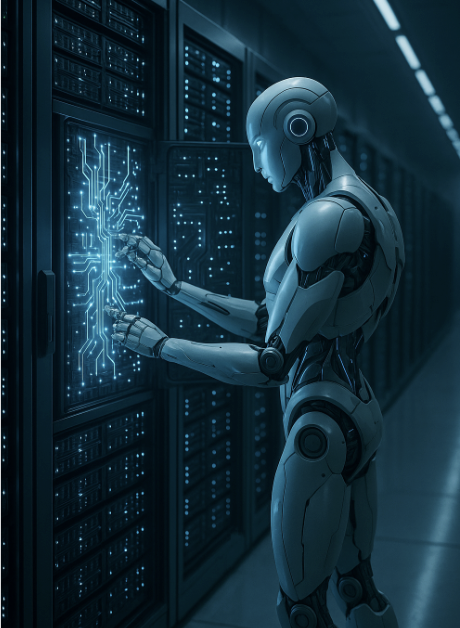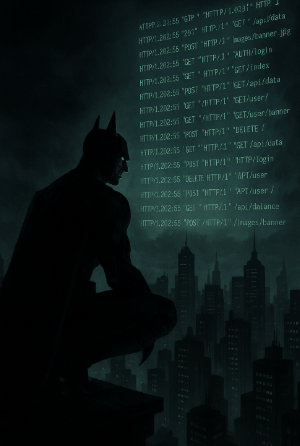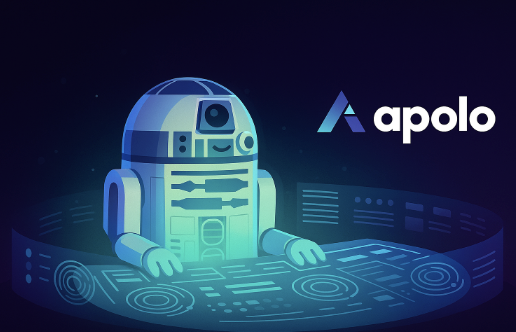Forget chatbots. The real AI is backstage making sure your company doesn't spontaneously combust.
Everyone's freaking out about AI. Again. Because a chatbot wrote a limerick and passed the LSAT. Cute. Ivy League dropout energy.
Meanwhile, the AI that actually matters? It's offstage, sipping an Americano, doing the real work, and not asking for a single round of applause (an Americano is just espresso with a hydration kink. Coffee already has water. You don't need to drown the espresso just to feel something, Gabe).
Let's talk about the real MVP. The AI that doesn't interrupt meetings with "Hi! Need help?" but silently prevents your infrastructure from face-planting like a malfunctioning droid on Tatooine. And without whining about sand.
The best AI doesn't need a chat window. It just quietly delivers uptime.
What You See Isn't the Whole Story
People think AI means chatting with a smug little assistant who calls you by your first name like you're old friends. But the real AI flex isn't in writing emails for you. It's in deciding whether you even need to send that email in the first place.
Like, it's not the bot that says "Hey Ash, here's your to-do list" that saves your Monday. It's the model that says, "You know what? Skip that meeting entirely. It's a waste of oxygen."

That lead score? AI. That eerily perfect delivery window? AI. That one HR decision you didn't regret? Yeah. AI.
This is your Jarvis moment. Not the smug voice assistant from Iron Man (2008). The backend beast making everything click while Tony hogs the credit (search your feelings, Gabe, you know it to be true).
Also, 35% of companies are already using AI in IT ops without a single customer-facing pixel involved. That's from theIBM Global AI Adoption Index 2022. (IBM)
Backstage, the Real Show Is Happening
Picture this. You're watching Star Wars and everyone's gushing over Han Solo. But the one actually fixing the hyperdrive while everyone panics? R2-D2 (The Empire Strikes Back, 1980). That's the kind of AI we're talking about here. Quiet. Competent. Kind of saving the galaxy (unlike a certain other droid who treats war crimes like casual weekend errands. Looking at you, Chopper).

In logistics, AI is optimizing routes so well it's cutting fuel usage by 15%. That's not a cute headline. That's millions in savings and fewer trucks stuck in traffic listening to Joe Rogan. (SCS Tech Blog)
And then there are the data centers. You know, the ones powering all those "Can you generate a startup idea for me?" prompts. Google's DeepMind used reinforcement learning to cut cooling costs by 40%. Back in 2016. While the rest of us were teaching Alexa to order pizza, they were saving millions. Not flashy. Just aggressively efficient, like it's mad at your utility bill. (Google DeepMind)
This isn't sci-fi. It's not Skynet. It's Skynet if it ditched the whole "destroy humanity" thing and got really into HVAC.
And no, this isn't some "thought leadership" fluff piece. I wouldn't make you read 800 words just to say "AI good." I respect your time. I just don't respect your inbox.
The Quiet Revolution
Look, I love a good chatbot moment as much as the next productivity-obsessed tech goblin. But this fixation on "prompting" is just the surface. Underneath, it's Battlestar Galactica (2004-2009) level orchestration. No killer robots. Hopefully.
We're entering the AIOps era. That's where AI does what it was actually built for. Fixing stuff before it breaks. Muting alerts that don't matter. Spotting outages before your app collapses like a dying redshirt in Star Trek: The Original Series(1966-1969).
Vendors like Dynatrace and Datadog are building systems that don't just alert. They decide. They fix. They optimize. They're basically The Vision from Avengers: Age of Ultron (2015). Always online. Low drama. Highly effective. (Datadog) (Dynatrace)
This isn't the AI you chat with. It's the AI that works. And we need more of that.

Visibility Is Overrated
Here's a fun thought. If your AI needs to be seen to prove it's doing something, maybe it's compensating.
We're addicted to interfaces. Dashboards. Widgets. But some of the best tech isn't flashy. It's the Batman of your stack. Running silently in the background. Keeping Gotham safe while doing gravel-voiced monologues in the server logs (The Dark Knight, 2008).

Electricity doesn't ask for praise. Neither does the AI patching your systems while you're watching The Boys (2019-present) and ignoring Slack. The good stuff works. You don't need to see it.
So yeah, next time someone brags about their AI assistant booking their haircut, just know there's another AI making sure their payment processor doesn't explode. Different leagues.
Final Thoughts: Power ≠ Flash
The most powerful AI out there isn't painting portraits or writing tweets. It's making sure your company doesn't fall over when someone sneezes on a Kubernetes cluster.
It's not shiny. It's not "conversational." But it works. That's the kind of AI you want running the ship, and not just because it doesn't talk back.
And hey, if you're wondering how to actually run that kind of behind-the-scenes AI without getting buried in compliance chaos or burning your ops team to the ground?
That's literally what Apolo does. We're the R2-D2 of enterprise AI. No drama. Just uptime.

No chat. No fluff. No glow. Just go.
.svg)


